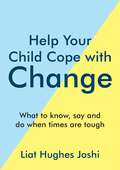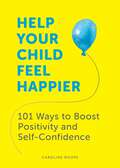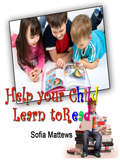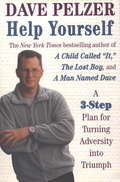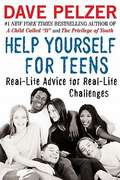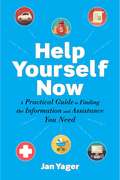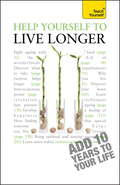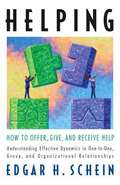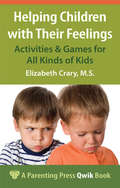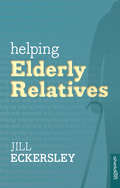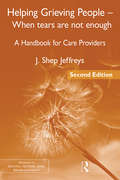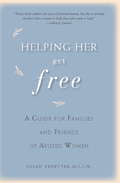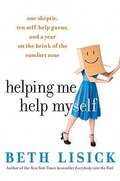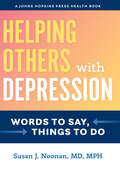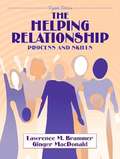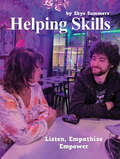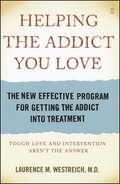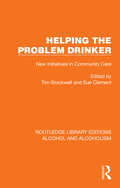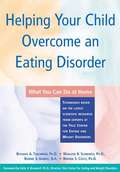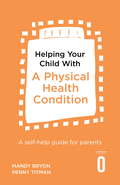- Table View
- List View
Help Your Child Cope with Change: What to Know, Say and Do When Times are Tough
by Liat Hughes JoshiThis accessible guide will help you to support your child through difficult experiences brought on by life changes, including divorce, new siblings, or the loss of a loved oneChange is part of life, but for a child it can be scary and bewildering. Whether it’s the prospect of starting school, dealing with changes in the family or seeing unsettling events in the wider world, there are many aspects of life that can cause a child to feel destabilized and frightened.As parents and carers, we try everything in our power to shield our children and prepare them emotionally for disappointments and upsets, but sometimes it can be hard to know what to do for the best. Help Your Child Cope with Change offers actionable tips that will give you and your child the support you need to navigate these difficult moments with kindness and care.Discover how to:Nurture resilience and a positive mindset in your childBreak bad news to your childEstablish behaviour boundaries and retain routines during difficult timesDeal with overwhelming emotionsSeek support
Help Your Child Cope with Change: What to Know, Say and Do When Times are Tough
by Liat Hughes JoshiThis accessible guide will help you to support your child through difficult experiences brought on by life changes, including divorce, new siblings, or the loss of a loved oneChange is part of life, but for a child it can be scary and bewildering. Whether it’s the prospect of starting school, dealing with changes in the family or seeing unsettling events in the wider world, there are many aspects of life that can cause a child to feel destabilized and frightened.As parents and carers, we try everything in our power to shield our children and prepare them emotionally for disappointments and upsets, but sometimes it can be hard to know what to do for the best. Help Your Child Cope with Change offers actionable tips that will give you and your child the support you need to navigate these difficult moments with kindness and care.Discover how to:Nurture resilience and a positive mindset in your childBreak bad news to your childEstablish behaviour boundaries and retain routines during difficult timesDeal with overwhelming emotionsSeek support
Help Your Child Feel Happier: 101 Ways to Boost Positivity and Self-Confidence
by Caroline RoopeSeeing your child experience unhappiness is difficult for any parentWith so many possible reasons for low mood, it can be challenging to know how best to support them. This guide will help you to communicate with your child and equip them with the tools to express themselves. Offering ideas for simple lifestyle tweaks, it will help you to help your child foster a more positive outlook and to build their resilience and self-confidence for life.Identify the source of your child’s low moodNurture a positive mindsetBuild self-confidenceLearn mood-boosting activitiesKnow when to seek support
Help Your Child Feel Happier: 101 Ways to Boost Positivity and Self-Confidence
by Caroline RoopeSeeing your child experience unhappiness is difficult for any parentWith so many possible reasons for low mood, it can be challenging to know how best to support them. This guide will help you to communicate with your child and equip them with the tools to express themselves. Offering ideas for simple lifestyle tweaks, it will help you to help your child foster a more positive outlook and to build their resilience and self-confidence for life.Identify the source of your child’s low moodNurture a positive mindsetBuild self-confidenceLearn mood-boosting activitiesKnow when to seek support
Help Your Child Learn to Read: Jubiläumsedition Zum 102. Todesjahr Von Karl May (Correct Times)
by Sofia Mattews"Why?"?This is the question we parents are always trying to answer. It's good that children ask questions: that's the best way to learn. All children have two wonderful resources for learning--imagination and curiosity. As a parent, you can awaken your children to the joy of learning by encouraging their imagination and curiosity.?Helping Your Child Learn to Read is one in a series of books on different education topics intended to help you make the most of your child's natural curiosity. Teaching and learning are not mysteries that can only happen in school. They also happen when parents and children do simple things together.?For instance, you and your child can: sort the socks on laundry day-sorting is a major function in math and science; cook a meal together-cooking involves not only math and science but good health as well; tell and read each other stories--storytelling is the basis for reading and writing (and a story about the past is also history); or play a game of hopscotch together playing physical games will help your child learn to count and start on a road to lifelong fitness.?By doing things together, you will show that learning is fun and important. You will be encouraging your child to study, learn, and stay in school. Enjoy your ebook "Help Your Child Learn To Read"!
Help Yourself: Celebrating the Rewards of Resilience and Gratitude
by Dave PelzerFrom the Book jacket: As more than three million readers have learned from his three previous books, Dave Pelzer doesn't believe in feeling sorry for himself. Abused mercilessly by his mother as a child, Dave has taken everything that happened to him and turned it into something positive so that he can help others. Now happily married and with a child of his own, he celebrates the twin pillars of strength that saw him through his darkest hours: resilience and gratitude. And he shows how anyone can tap in to these virtues to live a better and more fulfilling life In Help Yourself, Dave Pelzer explains how we can move beyond a painful history, harmful negative thoughts, and innumerable setbacks by taking control and being accountable for our lives. Pelzer's three autobiographical books are available from Bookshare in a collected edition titled, "My Story."
Help Yourself
by Dave PelzerAbused by his mother as a child, the author has taken everything that happened to him and has turned it into something positive in order to help others. Now, he explains how to move beyond a painful history, harmful negative thoughts, and innumerable setbacks and urges readers to take control and be accountable for their lives.
Help Yourself for Teens
by Dave PelzerAs featured on Oprah Dave Pelzer, author of the acclaimed, best-selling books A Man Named Dave and Help Yourself, continues his tireless crusade against despair with Help Yourself for Teens, an uplifting new book written specifically for young adults. Sharing stories of his own adolescent struggles-fighting for his life against his alcoholic mother and enduring outrageous oppression at the hands of bullies and false friends-Pelzer imparts advice to help young people rise above their circumstances and achieve greatness. He offers teenagers practical solutions for overcoming their own hardships, focusing on three areas: facing current and past problems; realizing the importance of decisions; and finally, never giving up on oneself. Through it all, Pelzer never lets his readers forget that they alone have control over the outcomes of their lives. Pelzer’s uplifting and practical advice strives to tackle issues ranging from physical and sexual abuse to identifying spousal disagreement. Part self-help book and part inspirational memoir, Help Yourself for Teens is an empowering and uplifting guide to growing up in an often difficult world. .
Help Yourself Now: A Practical Guide to Finding the Information and Assistance You Need
by Jan YagerHow to Find Help for Any Situation Although we live in the age of information and everyone is bombarded with potential sources of help, sifting through those possibilities can be a chore. This is where Help Yourself comes in! With this useful reference, author Jan Yager provides an overview of the various situations that most people have to navigate, from calling customer service or reporting a crime to finding credible and reliable information about a business, health, or legal concern. Each chapter includes a brief discussion of an issue, potential scenarios, and listings of relevant national and international organizations. Yager also instructs readers on researching state agencies, so they can contact appropriate organizations closer to home. Important topics of discussion include: Health insurancePersonal financesHousing assistanceEmployment servicesFamily planningK–12 educationCollege selection and fundingSmall business developmentLegal servicesCrime victim resourcesSubstance abuseEmergency preparednessAnd more
Help Yourself to Live Longer: Teach Yourself (Teach Yourself General Ser.)
by Paul JennerThis book is designed as a ten-step guide that will add ten (healthy, happy) years to your life. It offers sound advice on health and fitness issues, and will cover diet and relaxation, in addition to such emotional issues as happiness, love and spirituality. It is all based, not on guru driven theories of bizarre diets or exercise routine, but on common sense and positive thinking, twinned with information that is both practical and supported widely by the scientific and medical communities. The tone is positive and encouraging throughout; there are also plenty of opportunities for you to interact with the book through features such as quizzes, self-test boxes and exercises.Teach Yourself - the world's leading learning brand - is relaunched in 2010 as a multi-platform experience that will keep you motivated to achieve your goals. Let our expert author guide you through this brand new edition, with personal insights, tips, energising self-tests and summaries throughout the book. Go online at www.teachyourself.com for tests, extension articles and a vibrant community of like-minded learners. And if you don't have much time, don't worry - every book gives you 1, 5 and 10-minute bites of learning to get you started.* A flexible guide that will add ten happy and healthy years to your life* Designed for readers of all ages, backgrounds and abilities - you make the changes you want to make, and you can make them now* All the advice is based on scientific and medical research with plenty of wisdom and commonsense* Not just about your health and fitness, this book also covers relationships, love and spirituality* Lots of interactive exercises and sample tips
Helping: How to Offer, Give, and Receive Help
by Edgar H. ScheinIn this seminal book on helping, corporate culture and organizational development guru Ed Schein analyzes the dynamics of helping relationships, and explains why help is often not helpful.
Helping Children with Their Feelings: Activities & Games for All Kinds of Kids
by Elizabeth CraryProviding the basics of a child’s emotional development, this book pays particular attention to children who have learning challenges related to autism, ADHD, sensory issues, or other developmental delays A short course for busy parents, teachers, and professionals, Helping Children with Their Feelings sets parents on a clear, practical path to increase their child’s understanding of his or her own and others’ feelings. Often young kids need remedial or basic help learning about feelings—an essential precursor to effective social relationships and success in school. Children are primed to start learning about feelings from birth, but sometimes they need a little extra help or their parents need additional knowledge. The short exercises help build children’s skills and provide realistic expectations for parents to determine whether their child is developing typically or has special needs. Further resources offer more in depth material of a practical nature on each of the steps in building emotional literacy.
Helping Elderly Relatives
by Jill EckersleyBy 2033, almost a quarter of the British population is predicted to be over 65, and 5% will be over 85. This means that more of us will be responsible for someone who is elderly and possibly frail. Yet, even in this age of the internet, many of us have no idea what older people are entitled to, and much help and money goes unclaimed. In addition, not everyone ages gracefully. The problems can be compounded by someone who is difficult to help, and refuses to co-operate with family carers or medical and social work professionals. This book offers practical solutions and emotional support for those looking after older parents or other relatives. Topics include: Mental distress in later life, such as anxiety and depression; The rise in problem drinking among older people; Mental disorders, including schizophrenia, bipolar disorder; personality disorder; Dementia; Housing and social options; If the relationship breaks down; Care for the carer - looking after yourself.
Helping Elderly Relatives
by Jill EckersleyBy 2033, almost a quarter of the British population is predicted to be over 65, and 5% will be over 85. This means that more of us will be responsible for someone who is elderly and possibly frail. Yet, even in this age of the internet, many of us have no idea what older people are entitled to, and much help and money goes unclaimed. In addition, not everyone ages gracefully. The problems can be compounded by someone who is difficult to help, and refuses to co-operate with family carers or medical and social work professionals. This book offers practical solutions and emotional support for those looking after older parents or other relatives. Topics include: Mental distress in later life, such as anxiety and depression; The rise in problem drinking among older people; Mental disorders, including schizophrenia, bipolar disorder; personality disorder; Dementia; Housing and social options; If the relationship breaks down; Care for the carer - looking after yourself.
Helping Grieving People – When Tears Are Not Enough: A Handbook for Care Providers (Series in Death, Dying, and Bereavement)
by J. Shep JeffreysHelping Grieving People – When Tears Are Not Enough is a handbook for care providers who provide service, support and counseling to those grieving death, illness, and other losses. This book is also an excellent text for academic courses as well as for staff development training. The author addresses grief as it affects a variety of relationships and discusses different intervention and support strategies, always cognizant of individual and cultural differences in the expression and treatment of grief. Jeffreys has established a practical approach to preparing grief care providers through three basic tracks. The first track: Heart – calls for self-discovery, freeing oneself of accumulated loss in order to focus all attention on the griever. Second track: Head – emphasizes understanding the complex and dynamic phenomena of human grief. Third track: Hands – stresses the caregiver's actual intervention, and speaks to lay and professional levels of skill, as well as the various approaches for healing available. Accompanying these three motifs, the Handbook discusses the social and cultural contexts of grief as applied to various populations of grievers as well as the underlying psychological basis of human grief. Throughout the book, Jeffreys presents the role of the caregiver as an Exquisite Witness to the journey of grief and pain of bereaved family and friends, and also to the path taken by dying persons and their families. The second edition of Helping Grieving People remains true to the approach that has been so well received in the original volume. It includes updated research findings and addresses new information and developments in the field of loss, grief and bereavement.
Helping Her Get Free: A Guide for Families and Friends of Abused Women
by Mssw Susan BrewsterSeal Press originally published Helping Her Get Free with the title To Be an Anchor in the Storm. The survivor of an abusive relationship herself and a licensed counselor of abused women for more than a decade, Susan Brewster teaches readers how to recognize the signs of abuse, handle negative feelings, become an effective advocate, deal with the abuser, and more. With a new introduction and updated resource section, this straightforward and compassionate book offers the information needed to help give strength to women who are trying to break free.
Helping Me Help Myself
by Beth LisickBeth Lisick has had a lifelong phobia of anything slick, cheesy, or that remotely claims to provide self-empowerment. But on New Year's Day 2006, she wakes up finally able to admit that something has to change. Determined to confront her fears head-on, Beth sets out to fix her life by consulting the multimillion-dollar-earning experts. In Chicago, she gets proactive with The Seven Habits of Highly Effective People. In Atlanta, she struggles to understand why "women are from Venus." She gamely sweats to the oldies on a weeklong Cruise to Lose with Richard Simmons on the high seas of the Caribbean. Throughout this yearlong experiment, Beth tries extremely hard to maintain her wry sense of humor and easygoing nature, even as she starts to fall prey to some of the experts' ideas--ideas she thought she'd spent her whole life rejecting.
Helping Others with Depression: Words to Say, Things to Do (A Johns Hopkins Press Health Book)
by Susan J. NoonanA comprehensive guide to how family members and friends can help someone who has depression.Mood disorders such as depression and bipolar disorder are biologic conditions of the mind and body that affect our everyday functioning, thoughts, feelings, and actions. Often devastating to the person, mood disorders can also be overwhelming to their family and close friends, who are frequently the first to recognize the subtle changes and symptoms of depression and the ones who provide daily support. Yet many feel unsure about how to help someone through the course of this difficult and disabling illness. This book is written for them.In Helping Others with Depression, Dr. Susan J. Noonan speaks firsthand from her perspective as a physician who has treated many patients, as a mental health Certified Peer Specialist, and as a patient with personal experience in living with the illness. Her combined professional and personal experiences have enabled her to write an evidence-based, concise, and practical guide to caring for someone who has depression or bipolar disorder, including men, women, teens, and seniors. In this compassionate book, Dr. Noonan • describes effective communication and support strategies to use during episodes of depression• combines sample narratives with concrete suggestions for what to say and how to encourage and support a loved one• offers essential advice for lifestyle interventions, finding appropriate professional help, shared decision making, and paying for treatment• helps readers understand how to navigate difficult situations, such as a loved one refusing treatment or grappling with suicidal thoughts • explains how caring for a person with a mood disorder creates unique challenges—and how to address those challenges• explores how concerned loved ones can use mobile applications and other technology to help• focuses on different populations, including teenagers, older adults, and people with substance abuse issuesShe also covers ways to model resilience, explains the concept of recovery—while describing what recovery looks like—and explores how caregivers can and must care for themselves. Featuring tables, vignettes, and sidebars that convey information in an accessible way, as well as comprehensive references, resources, and a glossary, this companion volume to Dr. Noonan's patient-oriented Take Control of Your Depression is an invaluable handbook.Praise for Other Books by Susan J. Noonan"This practical and compassionate handbook is perfectly suited to individuals living with depression: in accessible language, it offers firm, specific advice and quick cognitive tests and self-assessment metrics that even those in the deepest of doldrums will find helpful and relevant... Noonan's is a valuable volume for those suffering from depression, as well as for loved ones who are fighting the fight by their side."—Publisher's Weekly"This book offers useful insight for any health professional working within mental health... It is of enormous value to the layperson, hungry for knowledge about how best to interact and help their loved one face the dreadful ravages of depression."—Nursing Times
The Helping Relationship: Process and Skills
by Lawrence M. Brammer Ginger MacdonaldThe Helping Relationshipis a book for learning and teaching basic philosophy, helping skills, and processes that are essential grounding for most professions and for all human-contact occupations. The Helping Relationship presents and illustrates skills in the order in which they are used in the helping process. The primary emphasis in the helping process is to promote self-help, such as coping competence, to solve one's own problems and draw on one's own inner strengths. For social workers, counselors, business managers, nurses and anyone involved in the helping professions.
Helping Skills
by Skye SummersHave you ever tried to help but you didn’t know how? This book gives you a step-by-step guide on how to listen, understand and guide people into solving their problems. A must for counsellors! This textbook of interpersonal and problem-solving skills should be a prerequisite for anyone entering the helping profession, or even just looking for ways to help loved ones through challenging times.
Helping the Addict You Love: The New Effective Program for Getting the Addict into Treatment
by Laurence WestreichIt's okay to love them. It's your right to help them. Addiction destroys people and can even end lives. When you know or suspect that someone you love is suffering from addiction you have two goals: getting your loved one into treatment and turning that treatment into full-fledged sobriety. Many addiction experts tell you that you have to disengage or risk being an enabler, a codependent bystander, in the wreckage of an addict's life; that you have to cut all ties or be taken advantage of financially and emotionally; that you have to protect yourself from your loved one, who isn't the person you used to know. But many friends and family members find it unnatural, even impossible, to turn away from a person they love who is at his lowest point, and refuse to believe that their addict is lost to addiction. Backed by his years of experience, Dr. Westreich guides you through the process of getting the addict you love on the road to treatment and recovery. He provides detailed scripts to lead you through pivotal conversations with the addict in your life, highlighting the words that he's found to be most effective and the words to avoid. With this book in hand, family and friends will know, for example, how to motivate their addict to recognize his problem based on the addict's own definition of what addiction looks like; how to "raise the bottom" that addicts so often must hit to a more acceptable level -- such as embarrassment, job loss, or ill health; and when to use gentle disagreement, quiet listening, or forceful confrontation to move the addict toward treatment, while managing and protecting their own emotions. Dr. Westreich also shows you how to engage a therapist in the process and provides methods for combating an addict's defense mechanisms. By outlining several treatment options, he helps you to weigh what each can and cannot accomplish, which is the most effective treatment for the kind of addiction you are dealing with, what each treatment requires of the recovering addict and the friend or family member, and how successful each is. Dr. Westreich also takes care to discuss the kinds of special situations you may face when the addict in your life, in addition to having a substance abuse problem, is a minor, is pregnant, has mental or medical diseases, or has other issues that are likely to affect recovery. Helping the Addict You Love is the guide that so many loved ones of addicts have desperately needed. Dr. Westreich supports you through the emotional process of helping the addict you love, tells you it's okay to want to help, and teaches you how to do so.
Helping the Problem Drinker: New Initiatives in Community Care (Routledge Library Editions: Alcohol and Alcoholism)
by Tim StockwellOriginally published in 1987, Helping the Problem Drinker addressed the realisation that only a small proportion of problem drinkers ever contacted existing treatment agencies, and that therefore a more comprehensive community-oriented approach should be developed. This included training of primary care health workers and the development of multidisciplinary Community Alcohol Teams. At the time other community-based initiatives such as self-help groups for early problem drinkers and early intervention programmes in general practice and general hospitals, had been implemented. This book draws together what had been learned about these new developments, a number of which had now been evaluated. The book will still be of interest to all planners and professional staff concerned with alcohol problems: both specialists and non-specialists in general medicine, psychiatry, psychology and the social services.
Helping Your Child Overcome an Eating Disorder
by Marlene B. Schwartz Bonnie S. Gordic Brenda S. Coyle Bethany A. TeachmanThis book, written by the clinical and research staff at the Yale Center for Eating and Weight Disorders, offers practical and scientifically supported strategies for intervention to ultimately return your child to a life of healthy eating. This new guide will assist you as you develop a family plan, which is essential for helping your child overcome his or her problems. You will learn how to: communicate effectively with your child about eating behaviors, access the latest psychological treatments, deal with eating and exercise in the home, and more. Bookshare has other books about eating disorders.
Helping Your Child with a Physical Health Condition: A self-help guide for parents (Helping Your Child)
by Mandy Bryon Penny TitmanHas your child received a medical diagnosis for a long term illness or health condition?If so, this can be a stressful time for you both. You may have noticed changes in your relationship and behaviour towards your child. For example many parents feel that their child needs more understanding, is more fragile or is struggling to cope physically or emotionally. Your discipline parenting style may change if you feel that they 'suffer enough' already. Parents often find their confidence and judgement gets knocked off track in the early stages following a diagnosis, but given time and support, they do adapt and develop resilience in themselves and in their child.This book can help you with: · Emotional support for managing difference and dealing with difficult behaviour· Practical suggestions for easing hospital anxiety or navigating feeding problems· Advice on what to say and when to your child about their illness· How to ensure you don't neglect yourself or the rest of your familyWritten by experts in childhood illness, this step-by-step guide is for any parent who feels isolated or lacking in support.Helping Your Child is a series for parents and caregivers to support children through developmental difficulties, both psychological and physical. Each guide uses clinically proven techniques.Series editors: Professor Peter Cooper and Dr Polly Waite
